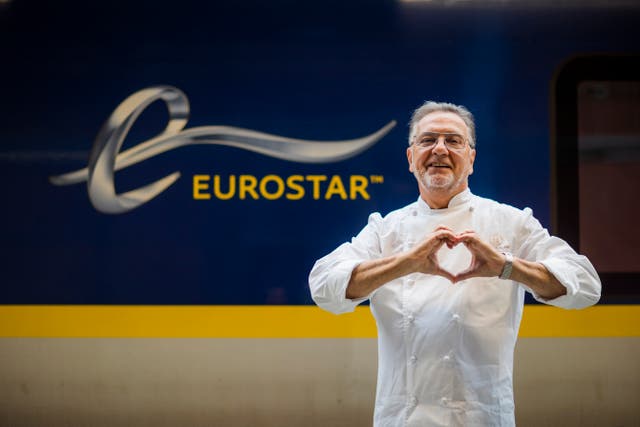
“If you do that, you’re dead.”
So says chef Raymond Blanc OBE when I ask him if, 10 years after first starting as Eurostar’s culinary director, he ever feels uninspired or – shock horror – resorts to recycling old menus.
“As a chef, whatever you do, even if you’ve done that dish a thousand times, if you stop looking at it with curiosity, that dish dies. That’s true to life, to a relationship. I’m lucky that I have a child’s curiosity – I keep asking questions,” he tells me.
The chef patron at Le Manoir aux Quat’ Saisons, the acclaimed foodie restaurant-hotel in Oxfordshire with two Michelin stars, Blanc probably could afford to rest on his laurels at this stage of his career. But his passion for showcasing the best local, seasonable produce, creating menus that are as sustainable as they are tasty, remains undimmed.
It seems to be why the partnership between Blanc and Eurostar has lasted for so long. Not content with being the most environmentally friendly form of transport when it comes to crossing the Channel – only producing 4kg of carbon emissions per passenger on a London-Paris trip compared to 57.8kg by plane – Eurostar set itself the extra challenge of offering onboard catering that was equally low impact.
Since pairing up with Blanc a decade ago, the company has worked intensively with the Sustainable Restaurant Association (SRA), a not-for-profit membership organisation encouraging businesses to up their sustainability game, to become the only transport company to achieve its highest accreditation of three stars – an accolade Eurostar has hung onto for three consecutive years.

“That’s why for me it’s a natural partnership with Eurostar, because they understand those values – their carbon footprint is so low,” says Blanc.
The SRA certification process is rigorous, grading food businesses across 14 categories, including their use of ingredients that are seasonal, Fairtrade or organic, not air-freighted, and sourced from farmers with high environmental and welfare standards.
And three stars is no mean feat – it demonstrates “exceptional” all-round sustainability, with companies having to score consistently well across every category, totalling at least 70 per cent. It took Eurostar seven years to achieve its first three-star rating, finally clinching it in 2019 and maintaining the standard the two subsequent years.
“We base our rating on three pillars of what we believe it means to be sustainable within food service,” says SRA senior project manager Isabel Martin, “which are: sourcing; society; and the environment. Within that we ask businesses questions around a range of topics such as animal welfare, traceability, how they treat their staff, how they interact with the local community, and then energy, water, waste, food waste, packaging… So it’s quite a comprehensive assessment.”
“It’s really great to see the level of commitment of everyone at Eurostar to make the dining options as sustainable as possible,” she adds.
Eurostar achieved three stars thanks to its weekly changing menu in Business Premier class – “which, for a business as large and complex as Eurostar is no small feat,” says Isabel – to showcase the best of local and seasonal ingredients; comprehensive information being provided to staff on every single dish, including provenance and suppliers’ stories; and its decision to switch from paper to digital menus, saving 100,000 menus a year. The company also works with food-waste app Olio in London to redistribute leftovers from its trains.
“We are probably the most seasonal restaurant that travels at 186 miles an hour, because we change our menu so often, with six permutations every day,” says Blanc. “I think more and more people are understanding seasonality. If it’s seasonal, it’s close to home, it has better taste, textures, flavours, colours and better nutrients. You help your farmer to keep his farm; you don’t import food from millions of miles away.”
He adds: “If we were all to embrace seasonal produce, we would all gain. Wait for your strawberries, wait for your peaches, your apricots, your plums. But we’re not patient – so we want our strawberries in the middle of winter, which taste of nothing. We all know the anticipation of the moment is often better than the moment itself. If we were able to wait, England would be able to sustain itself 70-80 per cent more, rather than importing 70 per cent of its food.”
So which comes first when designing menus with seasonality at their core: the ingredient or the concept?
“You look at what’s around and good and then you source it,” says Blanc. “It’s mostly around the seasons; the seasons define what you are going to eat. The garden at Le Manoir is the canvas on which I grow my dishes. In summer, there’s a glut of strawberries – so not only are they delicious but the price goes down. If you buy strawberries in the middle of January, it’s three times the price and horrible to eat.
“I think [seasonality] is a more responsible approach to food. It’s exciting.”
I’m certainly struck by the quality of the Business Premier food (especially compared to most inflight meals I’ve been subjected to in the past. A hunk of crusty bread with salty French butter to spread; a deep purple beetroot terrine with horse radish cream to start; a choice of mains, with wine-braised Charolais beef cheek and roasted Jerusalem artichoke, sustainably sourced smoked pollock and salmon, red cabbage, red onion and Granny Smith apple salad, and a Kentish Blue, chicory, apple, walnut and celery salad all on the menu. And then comes the cheese course (Comté, Ferme d’Ulterïa goat’s cheese, Agen prune), followed by a dessert of supremely decadent chocolate délice with hazelnuts and confit orange zest.
The menu is a celebration of Blanc’s 10-year Eurostar anniversary, featuring some of his favourite dishes from the last decade. For me, the proof is in the eating when it comes to Blanc’s point that seasonal produce is best – I can’t remember the last time I ate so well, and certainly not while on any form of transport.
“For years, we bought our food based on the outside – it’s all about how it looks. That perfect apple that shines,” says Blanc thoughtfully. “But then you ask, ‘OK, it’s beautiful, what’s in it?’ – and you realise sulphide, copper, pesticides, fertilisers, fungicides have been thrown on it. That’s why she’s beautiful. And we kill the flavour, and then produce all these illnesses. But I think more and more you’ve got a much more knowledgeable consumer who’s asking: ‘What’s inside? Where does it come from? What’s in it?’.
“Everything is going to change. The consumer is much more knowledgeable, much more aware, and wants to know where their food is coming from.”
When you catch the Eurostar, at least, you now have a pretty good chance of knowing where that is.
Source The Independent













